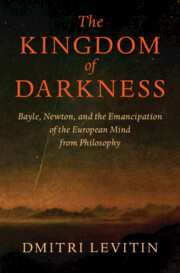Book contents
- The Kingdom of Darkness
- The Kingdom of Darkness
- Copyright page
- Contents
- Preface
- Abbreviations and Conventions
- General Prologue
- Part I Giving Up Philosophy
- Part II Pierre Bayle and the Emancipation of Religion from Philosophy
- II Prolegomena
- II.1 Greece, Asia, and the Logic of Paganism
- II.2 The Manichean Articles and the ‘Sponge of all Religions’
- II.3 Theological Method and the Foundations of Protestant Faith
- II.4 Virtuous Atheism, Philosophic Sin, and Toleration
- Part III Isaac Newton and the Emancipation of Natural Philosophy from Metaphysics
- Part IV The European System of Knowledge, c.1700 and Beyond
- Bibliography
- Index
II.3 - Theological Method and the Foundations of Protestant Faith
from Part II - Pierre Bayle and the Emancipation of Religion from Philosophy
Published online by Cambridge University Press: 23 March 2022
- The Kingdom of Darkness
- The Kingdom of Darkness
- Copyright page
- Contents
- Preface
- Abbreviations and Conventions
- General Prologue
- Part I Giving Up Philosophy
- Part II Pierre Bayle and the Emancipation of Religion from Philosophy
- II Prolegomena
- II.1 Greece, Asia, and the Logic of Paganism
- II.2 The Manichean Articles and the ‘Sponge of all Religions’
- II.3 Theological Method and the Foundations of Protestant Faith
- II.4 Virtuous Atheism, Philosophic Sin, and Toleration
- Part III Isaac Newton and the Emancipation of Natural Philosophy from Metaphysics
- Part IV The European System of Knowledge, c.1700 and Beyond
- Bibliography
- Index
Summary
This chapter expands the conclusions of II.2 to explore how Bayle thought it was still rational to be a Protestant, even if the mysteries of faith were beyond the grasp of reason. Bayle had been deeply influenced by certain Catholic theologians, above all Pierre Nicole and Antoine Arnauld, who had argued for the incomprehensibility of dogma, and the need to adopt a positive rather than a philosophical method in theology. But while for them this led to an emphasis on the authority of the Catholic Church, Bayle deployed the argument to defend (Reformed) Protestantism. For him, even if one acknowledged the incomprehensibility of the mysteries, there were still rational grounds to choose to believe some mysteries (e.g. predestination) over others (e.g. the Real Presence in the Eucharist). These reasons were grounded in historical testimony, approached probabilistically. In turn, we can completely revise of our understanding of Bayle’s debate with the so-called ‘rationaux’ (above all Jean Le Clerc and Isaac Jacquelot). Bayle was no more or less fideist than his opponents, who were no more ‘rationalist’ than him; indeed, Bayle’s position was directly influenced by Le Clerc. The debate between them was in reality a confessional one, with both sides accusing the other of rationalism. Le Clerc was arguing that Bayle was a rationalist beholden to philosophical determinism, and that a non-philosophical biblicism revealed the truths of Christianity – which happened to be Arminian. Bayle was arguing that Le Clerc was a philosophical rationalist beholden to the idol free will, and that a non-philosophical biblicism revealed the truths of Christianity – which happened to be Reformed.
- Type
- Chapter
- Information
- The Kingdom of DarknessBayle, Newton, and the Emancipation of the European Mind from Philosophy, pp. 375 - 422Publisher: Cambridge University PressPrint publication year: 2022



